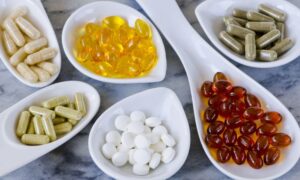Vitamins Part 1
 Vitamins are crucial for staying healthy and producing energy. Vitamins are like There are two different classes of vitamins. Water soluble and fat soluble. Water soluble means that they are transported by water, and that includes your B vitamins and vitamin C. Fat soluble are transported and stored via fat, and this includes vitamins A, D, E, and K. Below are the types of vitamins and a brief explanation of what they do for you, and where to find them.
Vitamins are crucial for staying healthy and producing energy. Vitamins are like There are two different classes of vitamins. Water soluble and fat soluble. Water soluble means that they are transported by water, and that includes your B vitamins and vitamin C. Fat soluble are transported and stored via fat, and this includes vitamins A, D, E, and K. Below are the types of vitamins and a brief explanation of what they do for you, and where to find them.
Fat Soluble
Vitamin A: This vitamin aids in vision, and skin health. Sources are yellow or orange fruits and green leafy vegetables.
Vitamin D: The function of vitamin D is to aid in bone health, and the absorption of other nutrients such as calcium and phosphorous. Food sources are egg yolks and fatty fish. You also get vitamin D from sunlight.
Vitamin E: This vitamin works as an antioxidant, helping to get rid of free radicals in the body. It also helps with formation of red blood cells. This can be found in eggs, leafy greens and milk.
Vitamin K: Vitamin K is very important because it is catalyst for many blood clotting factors. This is found in leafy greens and can be synthesized by intestinal bacteria. This is why it is important to get probiotics in your diet.
Fat Soluble
B Vitamins: Thiamin (B1), Riboflavin (B2), Niacin (B3), Pantothenic acid (B5), Pyridoxine (B6), Biotin (B7), Folate (B9), Cobalamin (B12). These are all your B vitamins and to describe what they all do is a whole other post which I will make in part 2. To summarize them, they all play a role in the production of energy and the production of DNA. Most of the B vitamins are found in animal foods, vegetables and fish.
Vitamin C: Vitamin C aids in wound healing and helps with the absorption of iron. Vitamin C is found in citrus fruits, potatoes, and dark green or yellow veggies.
